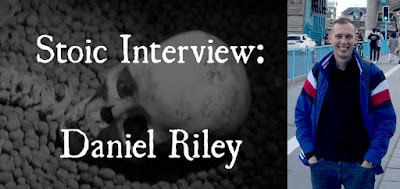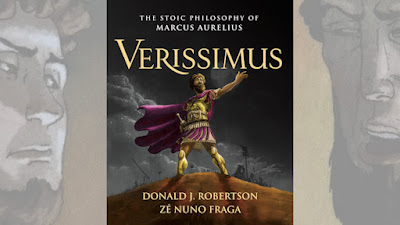Stoic Interview: Daniel Riley
Daniel Riley is a personal development blogger with a fervent interest in productivity, health and philosophy. It is this latter area that brought us to this interview. Daniel has not only embraced Stoic philosophy in his life, but also went on to create Stoic Store UK, a website that offers people handy little reminder objects that he hopes will help them to deepen their experience of the philosophy, and ultimately, benefit their lives.
In this interview we cover how Daniel was first exposed to Stoic ideas, which book he found most helpful in bringing those ideas into his everyday life, and why he thinks a dose of Stoicism answers a need for the modern world.
***
Casey: You created the Stoic Store UK website, and on your personal development website, you have a number of posts about how a variety of Stoic ideas have helped you with life. When were you first exposed to the Stoic philosophy and what were the elements of life that you thought it might improve for you?
Daniel: I was first introduced to Stoicism on the Tim Ferriss podcast. I had been fascinated by Tim and his work for a while, and the fact that he continuously recommended the philosophy as a tool to navigate modern life was enough for me to check it out. I absolutely loved all aspects of it, particularly its practical nature. I was generally interested in all areas of development then and there wasn’t a particular area that I hoped that Stoicism would improve. Luckily, I discovered that it is a tide that raises all boats anyway.
Casey: Ryan Holiday’s The Daily Stoic is a book that you give great credit to for helping to change your life. Why do you think a book that takes the ‘daily reflection’ approach to change proved to be so useful for you, and what steps, if any, did you take to make sure that you kept the concept for the day alive in your mind or experience?
Daniel: The daily reflection approach is so effective, in my opinion, because it gives very small bits of wisdom for you to chew over at a time. I think some of the longer format content out there on Stoicism is great, but if it is read like a regular book and not mulled over for some time with regular reflection intervals, then many of the concepts and points are just read for momentary mental enjoyment and lost in the crowd. They don’t change anything in our actual lives, which we sometimes forget is the purpose of these sorts of books.
I actually still found it quite difficult to assimilate the Stoic ideas into my everyday life. Trying to remember them as thoughts or memories throughout the day I found to be quite disruptive and counter-productive. I was reading about inner peace but I was constantly disrupting my own inner peace trying hard to remember what Marcus Aurelius said about inner peace.
One of the reasons that I created Stoic Store UK and physical products was to solve this conundrum that I feel that many philosophy-enthusiasts face. A quick glance at a coin on your desk or a ring on your finger can bring that ‘a-ha’ remembrance, rather than trying to remember longer quotes or anything like that.
Casey: In an Indiehackers post, you explained that the Memento Mori (“Remember that you must die”) coin was the first that you designed when you created the Stoic Store UK in early 2020. This was due, you said, to the notion of Memento Mori having had the biggest impact on your life. How did your attitude to life change when you fully digested this notion, and was it a ‘lightening bolt’ type moment or did it take much pondering to bring it about?
Daniel: It was certainly a lot of pondering and exposure to the concept that helped it to become a regular part of my life. Even now I keep my Memento Mori coin on my desk everyday. In my experience, the reminder needs to be constant due to the fact that the whole of our lives - from the plans we make, to the holidays we plan, to the schedule we have - all assume that we are going to be here for a long time. That, of course, is never guaranteed and we can quickly slip into the assumption and all of the negative fallout from that.
Perhaps more powerful for me was the concept of Memento Mori not applied to my own life, but to the lives of others. I am lucky enough to have an amazing family and incredible friends. Remembering that every time I see them might be the last time I see them helps me to try and make every interaction more direct, present and ultimately, loving.
 |
| A few of the available products on The Stoic Store UK |
Casey: Since the release of your first coin, Stoic Store UK has expanded into all kinds of Stoic reminders and material, from medallions and t-shirts, to a Stoic teachings pack of exercise cards. In your own experience, and from what you’ve seen with your web store, how much of a thirst is there for Stoic wisdom in this current day and age, and on another level, in your opinion, how much would society benefit by embracing some of Stoicism’s concepts?
Daniel: I think that Stoicism is certainly becoming more popular as there are many more books being written about the philosophy, promotion of it from public figures and from people’s own experience, they generally find some amount of value in it.
I believe that the ‘thirst for Stoicism’ comes from a deeper thirst for some sort of meaning to our modern day lives, and it seems that in a lot of cases the Stoic philosophy resonates more deeply with people than alternatives for this thirst. Much of our culture is obsessed with materialism, gaining more stuff, and the plane on which many people live is extremely superficial. What I have found with other people interested in Stoicism as well as with my own experience, there comes a point where this superficiality no longer satisfies. There is a pull towards the deeper meanings of life, the bigger questions that need to be asked, and I think Stoicism does a great job in trying to tackle some of these questions.
I think society would hugely benefit from embracing some of Stoicism’s concepts. It is one of the most practical, down-to-earth philosophies that there is and its focus is on action, rather than on theory and hypothesis which often don’t create much change.
***
Thanks to Daniel for taking the time to answer my questions.
You can read more from Daniel at his personal development website, at his Medium, and you can find some lovely Stoic products at Stoic Store UK.



.jpg)
.jpg)
.jpg)
